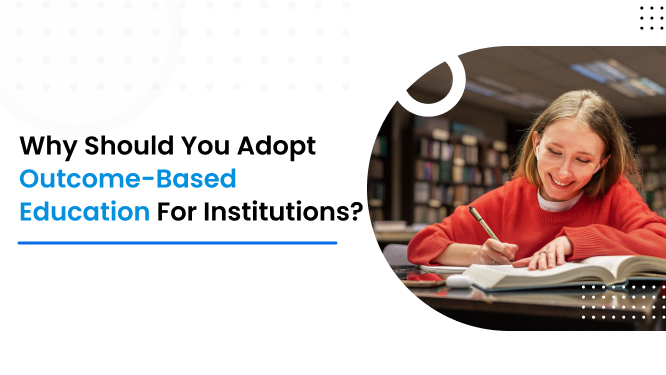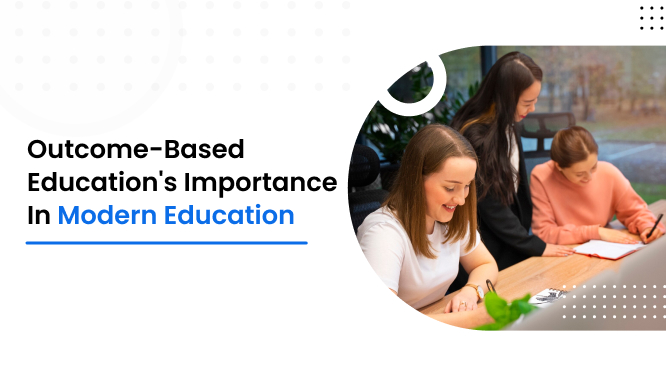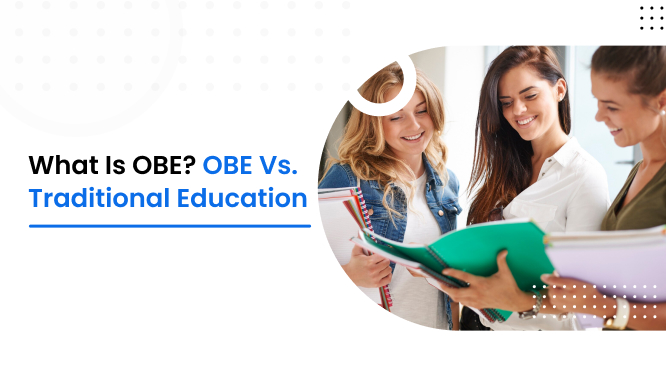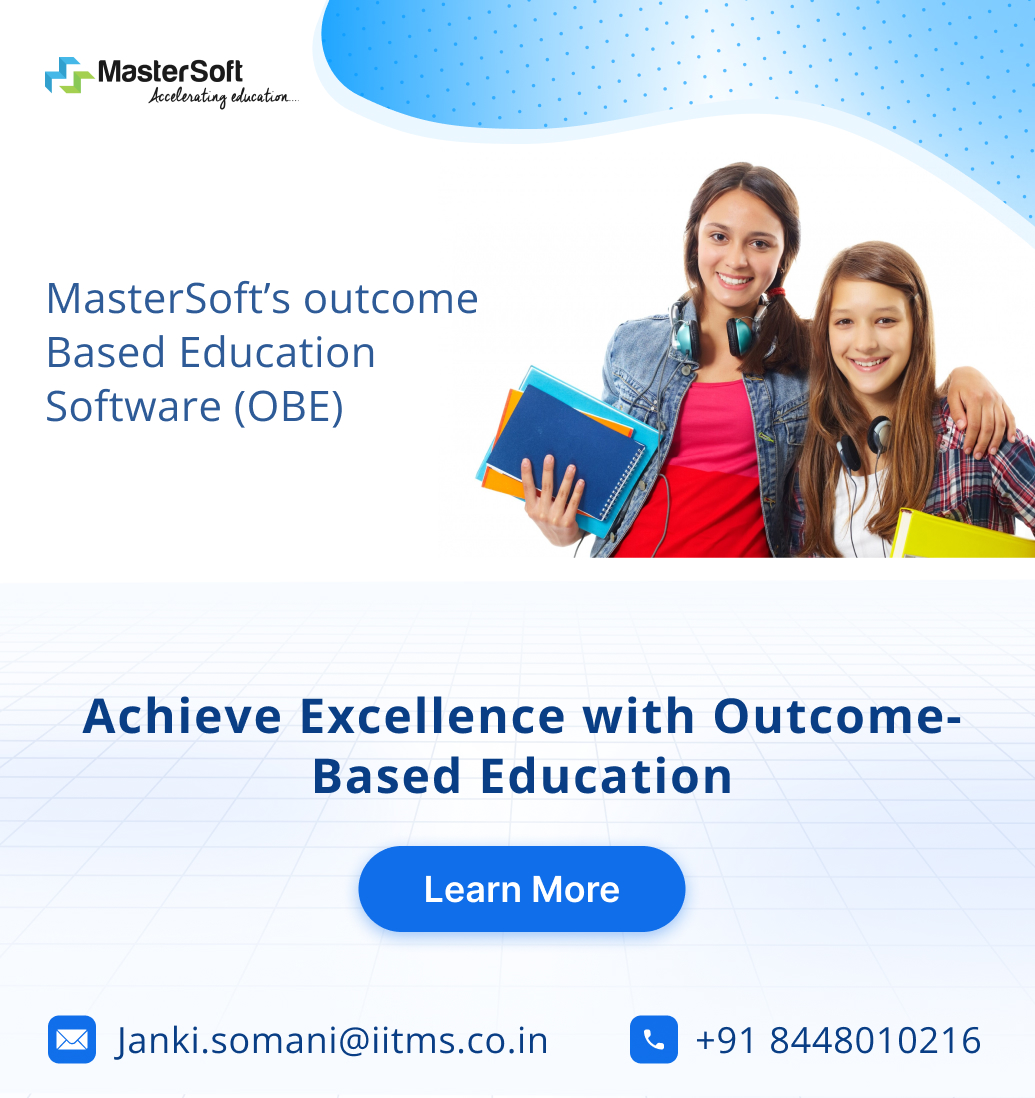Why Should You Adopt Outcome-Based Education For Institutions?
Fresh graduates struggling to secure jobs relevant to their field is a common scenario that requires urgent intervention. Therefore, education policies across the world emphasize modern education methodologies that promote holistic learning.
Shifting from a traditional academic system to outcome-based education is a primary strategy that most institutes implement. In fact, it is a major approach that has gained prominence in the last few years due to its scalability, quality assurance, and higher academic success.
But what is so special about outcome-based education (OBE) that institutes must adopt it? Let us find out:
What is Outcome-Based Education?
Outcome-based education is an innovative education approach that streamlines the curriculum content and activities according to specific goals. In effect, teachers include pedagogies that align with the outcomes.
Furthermore, they develop assessments that track the progress of students’s knowledge and understanding. Students engage in experiential learning activities instead of limiting themselves to textbook-oriented and passive learning.
Therefore, they gain discernible skills and knowledge, which they are able to demonstrate by the time they complete the term. Also, students get the opportunity to explore their capabilities in addition to mastering in-demand skills.
Reasons for Adopting Outcome-Based Education
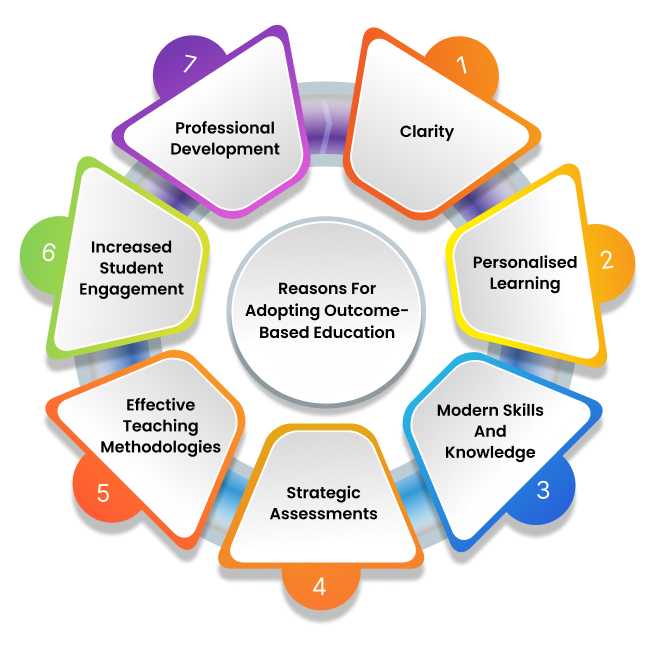
1. Clarity
Distraction and a lack of motivation lead students astray throughout the academic year, causing them to panic during exams. Besides, syllabus completion and assignment submissions put extra pressure on students.
The solution lies in outcome-based education, as it moves beyond outdated mechanisms and establishes a framework. This framework includes developing the following outcomes, which are as follows:
- Course Outcomes: Course outcomes relate to specific objectives for each course and involve gathering data on student performance.
- Program Outcomes: The overall objectives of a specific program are program outcomes that highlight the conclusion of learning experiences.
- Program Educational Objectives (PEOs): PEOs relate to the primary objectives of each program. Also, it describes specific skills and knowledge that students will attain after completing the program.
- Program-Specific Outcomes: PSOs relate to particular knowledge and skills essential to attaining and succeeding in a specific field.
2. Personalised Learning
A one-size-fits-all approach is a dominant pedagogical feature many institutes have followed for the longest time. However, it led to fragmented outcomes, with only a few able to succeed academically.
On the other hand, OBE replaces outdated methodologies with effective ones; for instance, it prioritizes a student-centric approach. It acknowledges that all students are unique individuals with varying capacities for learning.
Therefore, teachers can implement personalized learning paths, helping to address individual issues and challenges. Consequently, it allows educators to identify students’s strengths weaknesses and learning preferences.
All students get the opportunity to improve their capabilities, helping them prepare for future challenges.
3. Modern skills and knowledge
If a job aspirant’s resume reflects that he or she has relevant knowledge, why does he or she suffer rejection? The reasons are worth diving into, especially because they highlight skill and knowledge gaps.
In many instances, an individual might have theoretical knowledge but fail to demonstrate it in a practical scenario. That is the reason outcome-based education is the need of the hour because it emphasizes upskilling and reskilling.
For example, students learn the concepts of aerodynamics or quantum physics through real-life experiments and demonstrations. It is one of the finest examples of experiential learning, enabling students to get a glimpse of real-world applications.
Hence, it helps to develop critical thinking, analytical thinking, observation, computational ability, mathematical skills., etc. In effect, they learn and improve soft-core skills that complement their academic knowledge.
4. Strategic Assessments
Studying for the sole sake of passing a test or scoring good marks in the final exams are primary academic goals. Besides, an exam-centric environment fosters anxiety, fear, and regressive study practices.
Traditional examination systems seek to examine students’ subject-based knowledge. In contrast, outcome-based assessments assess students’ knowledge and skills based on established outcomes. Consequently, institutes benefit from implementing such assessments for the following reasons:
- It enables teachers to evaluate the extent of learning objectives or competencies that students have achieved.
- Assessments include different assignments that require learners to apply skills in the context of real-world scenarios.
- It includes formative assessments that enable teachers to monitor their real-time progress and provide feedback.
- Summative assessments evaluate student’s overall achievement and competency levels.
- All the outcome-based assessments and assignments aim to examine students’ abilities rather than evaluate their performance in specific activities.
5. Effective teaching methodologies
A major objective is to prepare students with core skills, knowledge, and qualities to succeed in specific fields by the time they graduate. However, achieving that goal is difficult unless institutes and teachers employ effective teaching methodologies.
Fortunately, outcome-based education emphasizes diverse instructional mechanisms, such as:
- Inquiry-based learning: Teachers ask questions or assign topics to explore and decipher by themselves, allowing independent learning. Students discover new facts and questions when they research and investigate.
- Cooperative and Cohesive Learning: Teachers pair up students with varying knowledge levels in a group and work together on an assignment. For example, they conduct science experiments and technical analysis.
- Tech-enabled Instruction: They use an interactive whiteboard to explain various concepts in detail through audio, video, and pictures. Also, they can use appropriate tools to conduct virtual trips.
6. Increased student engagement
Distraction and lack of interest are two byproducts of passive learning, which have little to no benefits in terms of learning outcomes. On the contrary, incorporating OBE-specific activities helps to establish a stimulating learning environment.
Consequently, students take an active interest, as they take ownership of their learning and strive to fulfil the small goals. Furthermore, it allows them to track their improvement and measure their skills and knowledge.
Also, prior knowledge of outcomes acts as a guiding light, helping them follow a specific path to accomplish targets.
7. Professional Development
Although outcome-based education strives to enhance student learning, it impacts the entire education system. Therefore, teachers are an indispensable part of the system; hence, they must adapt as per the learning and teaching requirements.
OBE establishes criteria for quality instruction, which involves adopting various methods to enhance students’s learning experiences. Therefore, institutes conduct professional development programs, helping students learn modern pedagogies.
Moreover, teachers get the opportunity to learn new educational technologies, assessment techniques, online/hybrid classes, etc. Additionally, they collaborate and interact with peers and experts to improve their abilities. As a result, they learn better ways of addressing and handling students’s issues.
How Can Institutes Adopt Outcome-Based Education?
- The first and foremost step is determining the mission and vision according to the different departments of the institute.
- Specify the Program Educational Objectives (PEOs) by collaborating with experienced faculty members and the Head of the Department (HOD).
- The program coordinator of the institute consults with senior faculty members and prepares the program outcomes. Also, they correspond with alumni members and industry representatives to edit and draft the document.
- Establishing the course outcomes.
- Mapping the course outcomes.
Wrapping it up,
Outcome-based education is a goal-oriented educational framework that provides a strategic approach to teaching and learning. It establishes a stimulating learning environment that fosters the skills of students.
In addition, teachers can apply flexible pedagogies, allowing students to adapt, progress, and attain learning objectives.
